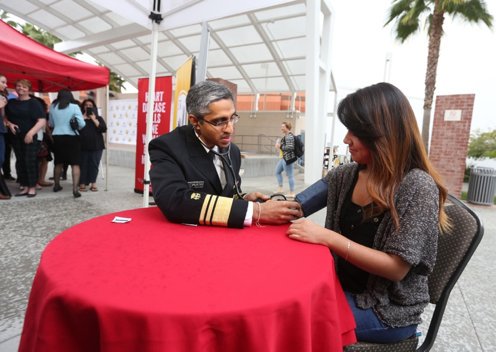Coming Together to Make Young Women’s Health a Priority

U.S. Surgeon General Vivek Murthy provides a heart health screening for a student at Cal State LA.
About the Cal State LA and WHA Initiative
WHA and Clinton Health Matters Initiative (CHMI) partnered to raise awareness among young women about their number one killers, heart disease and stroke, and empower them to act.
WHA launched the screening program during a forum at California State University, Los Angeles (CSULA) in October 2015 with U.S. Surgeon General Vivek H. Murthy and National Council of La Raza CEO, Janet Murguía, Dr. Rita Redberg, Professor of Medicine and Director of Women’s Cardiovascular Services at the University of California, San Francisco and Cal State LA President William A. Covino.
Forum participants urged Cal State LA students to take action against cardiovascular disease (CVD), which claims nearly 400,000 women’s lives each year, and called for action to raise awareness and make women’s heart health a priority.
Cal State LA’s population reflects the diversity of greater Los Angeles’s residents, with a student body of 27,000, about 60 percent of whom are Latino, 15 percent Asian American and four percent African American.
As gender disparities are evident in heart disease research funding and mortality, and sixty percent of students are women, the Cal State LA campus served as an appropriate audience for the forum’s message of action.
Cal State President Covino announced at the event that he will begin a dialogue with students, faculty and staff to create a smoke-free University. This process marks an important move for public health at the University, as smoking and exposure to second-hand smoke increases the risk of dying from heart disease and stroke.
Students also competed in a heart health codeathon event, hosted by the Clinton Health Matters Initiative, an initiative of the Clinton Foundation, where young developers and designers built original prototype apps to help young women decrease their risk of developing cardiovascular disease. The two-day event drew industry leaders from the tech, design and health fields.
Although the primary target audience for this effort is college-going women, the partners also hope to engage families, campus communities and healthcare professionals in reducing the risks to young women through prevention and awareness. The program screened almost 750 students in the first year.









